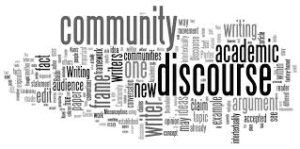In simplest terms, discourse is to speak about something (course or matter) which makes sense. It’s a language to express one’s own ideas and opinions through whichever medium possible. That is either verbally (oral communication), or non- verbally which includes sign languages (semantics).

Discourse can be defined as “a dynamic form of social practice which constructs the social world, individual selves, and identity”. On the basis of different discourses, every person’s identity is different and flexible which means that every person contributes something different to the society. Thus every individual internalizes different social dialogues which shape them. Depending on this, individuals are placed in the discursive category on different positions from where their power functions. The Discursive Psychology says that knowledge is less gained by perceiving true reality directly, but more created when two people interact and converse. It is then that the spoken or written language is analyzed known as the Discourse Analysis.
Discourse can be studied in reference to two periods: Modernism and Postmodernism. Modernism was the period when people were newly introduced to the different ways of life, be it the industrial revolution and scientific inventions or the philosophical movements, transformations along with cultural trends and changes. This was the period when modernist theorists believed that knowledge could be developed based on whatever exists as reality and is visible naturally, and thus social laws could be created. Modernist theorists were after finding the truth and reality of anything that exists. And in doing this whatever they explored or perceived would be used as the basis of their knowledge. For them discourse was functional. But then came in the Postmodernism theory. The postmodern theorists denied the modernists’ claims which said that there was one set-theoretical approach which could unveil all the complexities and aspects of the society. Postmodernists preferred experiencing and examining the different interests and experiences of individuals and base their studies on their researches.
In contradiction to modern theory, postmodern theory takes into account the individual differences rather than social laws. Thus they understood the value of discourse through communication and conversation. There’s no single answer to any question. When you ask different people the same questions, one will find that every answer is different from the previous they received because one thing was looked at from many mind’s eyes. Modernist aimed at finding truths, but postmodernists aimed at finding how these truths came into being and how they were produced. And what made someone say that the truth that exists is really the truth. Postmodernists wanted to see if there were alternatives to these pre-existing realities. And the solution they found to it was through discourse. Postmodernists debated that knowledge and truth are manifold which is historically prolonged through discourses till today. They sat down to analyze discourses such as texts, language, and policies.
Many postmodern discourse theories exist explaining the concept further. However, Michel Foucault’s Discourse Theory better known as the Foucauldian Discourse Analysis has widely contributed to explain the concept in modern philosophy. Michel Foucault was a French philosopher, social theorist and historian of ideas. In his article, ‘Power, Knowledge and Discourse,’ he mainly focuses on the relation between power and knowledge. He links power to the formation of discourse. He marks the shift of attention from language to discourse. According to him, discourse is a system of representation and a linguistic concept either through writing/ speech. He gave different meanings by focusing on rules and practices which produced meaningful statements in historical time. It’s a group of statements that provide a language for talking about or representing knowledge in a historical moment. Discourse is the production of knowledge through language and then practice. Language is what one says and practice is what one does. It influences how ideas are put into practice and regulate it. The discourse characterized by the way of thinking or the state of knowledge at any one time is called episteme. In explaining the discursive formation, he argues that; nothing has meaning outside of discourse and that every social configuration is meaningful. In reference to this, he supports his argument using the Constructivist Theory of Meaning and representation which tells how the meaning of physical things become an object of knowledge within the discourse and how human beings construct knowledge based on their experiences.
He thus says that different discourses or episteme supplant the already existing one, opening up a new discursive formation. The discursive practices according to him encapsulate ideas like evolvement of Language to discourse; elements of discourse; treating knowledge as power; institutional apparatus; and the new concept of power, in short. In relation to this concept, his other works could also be studied which include, ‘The Archaeology of Knowledge,’ ‘The History of Madness,’ ‘The Order of Things,’ etc. The theories of discourse whether modernist or postmodernist are used in politically oriented studies.
https://www.sciencedirect.com/science/article/abs/pii/S1045235413001275
https://en.wikipedia.org/wiki/Foucauldian_discourse_analysis
https://www.britannica.com/topic/cosmopolitanism-philosophy
Literature Student at Delhi University!
